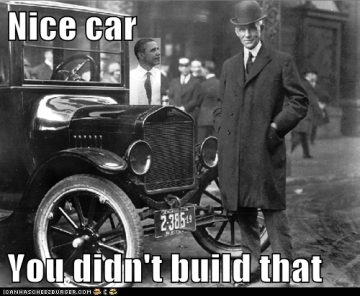Editor’s Note – Like many groups in this crazy world, history started at different times apparently. Revisionism is rife, and that skews opinions wildly. Obama appears to be one of those revisionists.
Of course, his history is what he says it is, and we have no clue what is real and what isn’t, and he applies that to his external world. Apparently Henry Ford never existed, the Wright Brothers, Colonel Sanders, Steve Jobs, and Benjamin Franklin never existed.
In today’s dollars, Franklin would be a billionaire – did any paved roads exist before he became rich of his own endeavors, before there was a US Federal Government?
“You didn’t build that!” … Oh yeah?
by Andrew C. McCarthy – PJ Media
One of the many great things about Paul Johnson’s magisterial A History of the American People is that he begins that history in the Sixteenth Century. There was an identifiable, culturally distinguishable American People long before there was a Revolutionary War, a Constitution, or a central government. The American People, by their industry and ingenuity, didn’t just build successful businesses … they built the most successful nation in history — and all, somehow, without HUD, Fannie, Freddie, the EPA, OSHA, …
In one of a thousand vignettes, Johnson tells the story of the founding of Springfield:
Elijah Miles, who moved to the Sangamon River country in 1823, left a record of how he founded Springfield. It was then only a stake in the ground. He marked out an 18-foot-square site for a store, went to St. Louis to buy a 25-ton stock of goods, chartered a boat, shipped his stock to the mouth of the Sangamon, and then had his boat and goods towed upriver by five men with a 300 foot tow-rope. Leaving his goods on the riverside — “As no one lived near, I had no fear of thieves” — he walked 50 miles to Springfield, hired waggons and teams, and so got his stuff to the new “town,”where his store was the first to open. It was the only one in a district later divided into fourteen counties, so “many had to come more than 80 miles to trade. Springfield grew up around him.
The president can try telling Americans they can’t build businesses, careers, communities and lives without his broke and broken Leviathan, but history and common sense prove him wrong every time. I’ve listened to some of this debate with fascination. Not at Obama — there is nothing surprising about his cockamamie claim that individual Americans could not have built their successful ventures without his central-planners providing the infrastructure of roads, bridges, police, firemen, schools and the like. What surprises me is the response of some on our side who argue that it was the other way around — that it was the successful ventures that prompted all the infrastructure.
Why would we concede the infrastructure to Obama?When it comes to human beings living in society and helping each other, why do we allow the president to treat we/us as if it were synonymous with the federal government. We built roads and bridges, policed our communities, put out fires, taught our children, and built our businesses before there ever was a federal government.
It is certainly true that, in modern times, the government has gotten itself involved in the infrastructure business. Very often, that has not been a positive development. At Reason, Matt Welch has a very interesting column about the building of the Golden Gate Bridge — which Obama likes to cite as a federal government success story that “benefitted everyone” and, so the story goes, made possible the success of the evil one-percenters.
The story is fiction. As Welch shows, the federal government did everything it could to prevent the Golden Gate from being built. The local people and businesses wanted it; but the Defense Department did not want it built and owned the land on either side of the channel, which it refused for a long time to sell. When it finally agreed to sell, it would not sell to the developers, only to a state commission. And the feds did not participate … other than to try to derail the project. That is, federal contractor unions held up the works, trying to extort their piece of the pie. Finally, because of the market’s collapse and the Great Depression, the bond financing ran into trouble, resulting in more delay until, finally, private capital — the personal wealth of A.P. Giannini — came to the rescue. The bridge was completed $1.7 million under budget, Welch recounts, “using non-union labor and private contractors.”
Matt Welch ends with a fabulous point. In today’s dollars, the $35 million cost of the Golden Gate Bridge translates into $530 million. That’s “far less than one percent of Obama’s stimulus package. So,” he asks, “where the hell are our new Golden Gates? What exactly has been the return on all this added ‘investment’?”
Human beings are social beings who act in their individual self-interest — which, common sense tells us, is often but far from always personal gain. Obama thinks the individual American, particularly if he is an entrepreneur, compares unfavorably to the noble federal government — as if the government were some altruistic “we” just looking to help. When the feds “help,” however, they are often an overbearing presence that depresses individual initiative. Those who run government are in it to wield power, mainly redistributing benefits to their favored, connected cronies. Government stifles the individual more than it empowers him.
The president should not be able to get away with equating such a self-interested behemoth with “us” — the people who help each other and make their communities, and ultimately the country, work. And the thought that the behemoth has become benevolent under Obama, and that we somehow would not have infrastructure without it, is laughable.


